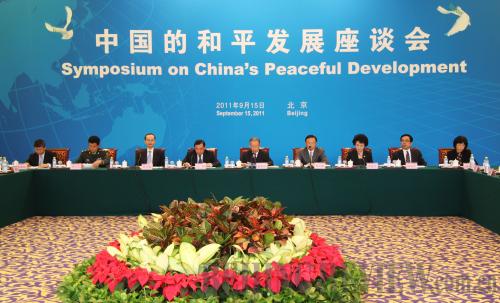|
 |
|
MAKING A COMMITMENT: Around 200 officials and scholars discuss China's future development path at the Symposium on China's Peaceful Development in Beijing on September 15 (LUO QI) |
Chinese State Councilor Dai Bingguo said on September 15 that China's peaceful development presents an opportunity rather than a challenge to the rest of the world.
Dai made the remark at a forum in Beijing attended by around 200 officials and scholars who discussed China's future development path.
The forum was held following the release of a white paper, titled China's Peaceful Development, by the State Council Information Office on September 6.
Dai said peaceful development is a strategic choice made by China to realize modernization, make itself strong and prosperous, and make more of a contribution to the lasting peace and common prosperity of the world.
"Peaceful development has become China's national will, and has been translated into national development plans," he said, adding that the path also needs the understanding, support and cooperation of the international community.
China's path of development has attracted a great deal of attention as the country becomes an important global player.
"There have been various doubts expressed about China's development, with some accusing it of being assertive, and some labeling it as energy hungry. Yet the white paper gives clear and pertinent responses to the international community's doubts on China's peaceful development," said Wang Jisi, Dean of the School of International Relations at Peking University.
The 13,000-character paper, the second of its kind released within six years, clarifies China's strategic intentions and demonstrates that the experiences of the past several decades have proved that the strategy of peaceful development is the correct path.
Dai said China's peaceful development is rooted in its deep-seated historical and cultural traditions and is determined by the country's basic national conditions.
"Chinese civilization is known to the world for being enduring, inclusive and open. The value of harmony and peace is deeply embedded in the minds of every generation of Chinese," Dai said. "The concept of harmony underpins the conduct of personal relationships, the relationship between man and nature and relationships between nations."
Foreign Minister Yang Jiechi, who also attended the forum, said that China has chosen peaceful development and cooperation as the basis for its foreign relations.
Concerning the argument that a stronger China should shoulder more responsibilities in world affairs, Yang said, "The foremost global responsibility that a country should shoulder is to manage well its own affairs, and not become a troublemaker."
He said that a country should only shoulder its global responsibility according to its capacity, which includes its national situation, strength and level of development.
"As for what responsibilities a country should shoulder, and how it can be counted as responsible, this cannot be determined by a few countries," Yang said.
China's rapid development has caused concern among the international community. The country, which had the sixth largest economy in the world in 2005, became the second largest in 2010.
"The consequences of China's development on the existing pattern of interests have caused anxiety among others living in 'the global village,'" said Qu Xing, Director of the China Institute of International Studies.
Bonnie S. Glaser, Senior Fellow of Freeman Chair in China Studies at the Washington-based Center for Strategic and International Studies, said the release of the white paper comes at an important moment.
"As China becomes more powerful economically and militarily, it is understandable that regional states are uneasy. The burden is on China to explain its intentions more clearly to the neighborhood and the rest of the world," Glaser told Beijing Review.
The white paper makes clear that the path of socialism with Chinese characteristics is the path of peaceful development.
"A socialist path with Chinese characteristics has a high degree of unity with China's peaceful development and the two are mutual preconditions. This is the key to understanding China's development strategy and development path," said Huang Renwei, Vice President of the Shanghai Academy of Social Sciences.
According to him, the white paper proceeds to generalize China's peaceful development strategy as the pursuit of development and harmony at home and the pursuit of cooperation and peace with foreign countries.
Figures in the white paper show over the past decade China imported goods worth around $7.5 trillion, generating about 14 million jobs in other countries and regions.
Wang Yiming, Deputy Director of the Institute of Macroeconomics at the National Development and Reform Commission, told the forum China's imports will be worth more than $8 trillion in the next five years, bringing the world great employment opportunities.
"While only 1 billion people, roughly 15 percent of the world's total, currently enjoy a modern life, the remaining 85 percent are still on their way to modernization. If China can realize industrialization that will benefit its 1.37 billion people as long as it realizes this development through peace and cooperation, people throughout the world will see their lives improve," said Jin Canrong, Vice Dean of the School of International Studies at the Renmin University of China. | 